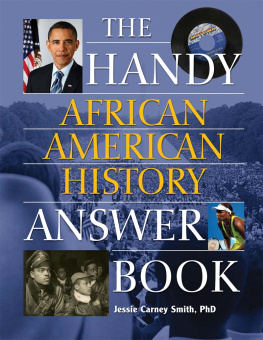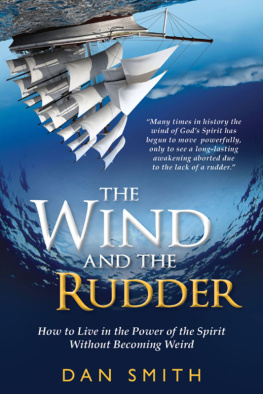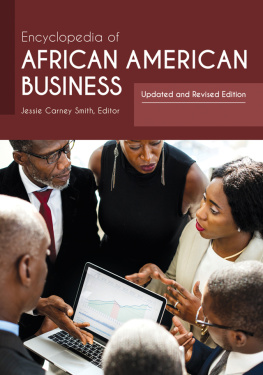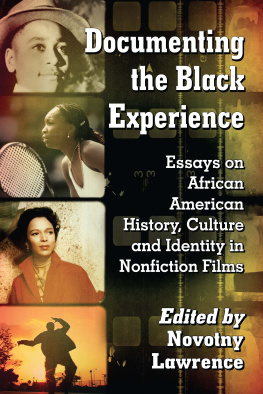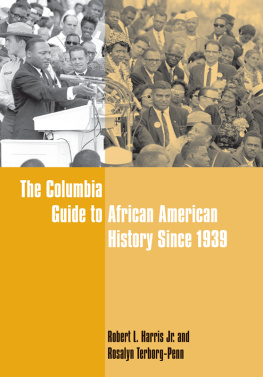About the Author

Noted author, scholar, educator, and librarian Jessie Carney Smith is Dean of the Library and William and Camille Cosby Professor in the Humanities at Fisk University, Nashville, Tennessee. She is a graduate of North Carolina A&T State University, Michigan State University, and Vanderbilt University, and she holds a Ph.D. from the University of Illinois.
In addition to the first and second editions of Black Firsts, her Visible Ink publications are Black Heroes and, with Linda T. Wynn, Freedom Facts and Firsts: 400 Years of the African American Civil Rights Experience. Other important works that she has written or edited include Encyclopedia of African American Popular Culture (3 volumes), Notable Black American Women (Books I, II, and III), Notable Black American Men (Books I and II), Encyclopedia of African American Business (2 volumes), African American Almanac (8th edition), Ethnic Genealogy, and Black Academic Libraries and Research Collections.
Dr. Smith has been honored widely with recognitions such as the National Womens Book Association Award; the Candace Award for excellence in education; the Anna J. Cooper Award for research on African American women from Sage magazine; the Academic/Research Librarian of the Year Award from the Association of College and Research Libraries; the Distinguished Alumni Award from the University of Illinois, Graduate School of Library and Information Science; and the Research Career Award from Fisk University.
Also from Visible Ink Press
African American Almanac: 400 Years of Triumph, Courage, and Excellence
by Leantin Bracks, Ph.D.
ISBN: 978-1-57859-323-1
Black Firsts: 4,000 Ground-breaking and Pioneering Events, 3rd edition
by Jessie Carnie Smith
ISBN: 978-1-57859-369-9
Black Heroes
by Jessie Carnie Smith
ISBN: 978-1-57859-136-7
Freedom Facts and Firsts: 400 Years of the African American Civil Rights Experience
by Jessie Carnie Smith
ISBN: 978-1-57859-192-3
More Handy Answer Books!
The Handy American History Answer Book
by David L. Hudson
ISBN: 978-1-57859-471-9
The Handy Civil War Answer Book
by Samuel Willard Crompton
ISBN: 978-1-57859-476-4
The Handy History Answer Book, 3rd edition
by David L Hudson, Jr.
ISBN: 9781578593729
The Handy Religion Answer Book
by John Renard, Ph.D.
ISBN: 978-1-57859-379-8
Please visit www.handyanswers.com for a complete list of Handy Answer titles and Visible Ink Press at www.visibleinkpress.com.


THE
HANDY
AFRICAN
AMERICAN
HISTORY
ANSWER
BOOK
Copyright 2014 by Visible Ink Press
This publication is a creative work fully protected by all applicable copyright laws, as well as by misappropriation, trade secret, unfair competition, and other applicable laws.
No part of this book may be reproduced in any form without permission in writing from the publisher, except by a reviewer who wishes to quote brief passages in connection with a review written for inclusion in a magazine, newspaper, or website.
All rights to this publication will be vigorously defended.
Visible Ink Press
43311 Joy Rd., #414
Canton, MI 48187-2075
Visible Ink Press is a registered trademark of Visible Ink Press LLC.
Most Visible Ink Press books are available at special quantity discounts when purchased in bulk by corporations, organizations, or groups. Customized printings, special imprints, messages, and excerpts can be produced to meet your needs. For more information, contact Special Markets Director, Visible Ink Press, www.visibleinkpress.com, or 734-667-3211.
Managing Editor: Kevin S. Hile
Art Director: Mary Claire Krzewinski
Typesetting: Marco Di Vita
Proofreaders: Chrystal Rozsa, Sharon Gunton
Indexer: Larry Baker
Cover images: Front cover: Serena William-Shutterstock; Barak Obama-Library of Congress; Civil Rights March (background)-Library of Congress; Tuskegee Airmen-Library of Congress. Back cover: Tuskegee Airmen (U.S. Air Force); Alvin Ailey American Dance Theatre (Knight Foundation); Chicago American Giants (Library of Congress); Condoleezza Rice (U.S. government).
Library of Congress Cataloging-in-Publication Data Smith, Jessie Carney, 1930
Handy African American history answer book /Jessie Carney Smith.
p. cm.
ISBN 978-1-57859-452-8 (pbk.)
1. African Americans-History-Miscellanea. 2. African Americans-Biography-Miscellanea. I. Title.
E185.S5814 2013
973.0496073-dc23
2013031270
Printed in the United States of America.
10 9 8 7 6 5 4 3 2 1
Contents
I NDEX
Photo Credits
3dhardway: .
AgnosticPreachersKid:
anthony turducken: .
dbking from Washington, DC:
Fisk University: .
Huber, C. Rudolf: .
Infrogmation of New Orleans: .
Jean-Luc: .
John Morse: .
Karenfaye: .
Knight Foundation:
Library of Congress: .
Louis Panassi .
MDCarchives: .
Michael Rivera: .
Mrssisaithong: .
Sanfranman59:
Shutterstock: .
TonyTheTiger: .
World Economic Forum: .
Published in the US before 1923 and public domain in the US: .
All other photos are in the public domain.
Timeline
| Year | Event |
| 1526 | The first recorded slave revolt in North American occurs, after Spanish explorers bring Africans to what is now South Carolina. |
| 1620 | By this time, musical styles and forms of entertainment of the black enslaved begin to take various forms. |
| 1700s | Free blacks are involved in the fashion industry, when Stephen Jackson makes hats of fur and leather. The industry carries over into slavery. |
| 1701 | The Society for the Propagation of the Gospel in Foreign Parts (SPG), headquartered in London, makes its first sustained effort to convert African Americans to Christianity. The SPG is a missionary movement that systematically seeks to evangelize and teach slaves. |
| 1746 | Lucy Terry (Prince), a slave and orator, writes the poem Bars Fight and becomes the first black American poet. It is not published until 1855. |
| 1758 | The independent black churches founded in Colonial America are Baptist. The first black Baptist church known to have begun during his period is the African Baptist or Bluestone Church. It is organized this year on William Byrds plantation located near Blue-stone River in Mecklenburg, Virginia. |
| 1760 | Poet and tract writer Jupiter Hammon is the first black to publish a poem as a separate work. He is also the first black American writer of prose. |
| 1770 | Crispus Attucks becomes the first black casualty in the American Revolution. |
| 1770s | Negro spirituals, or religious songs that black Americans sang since their enslavement in America, emerge during this time. |

